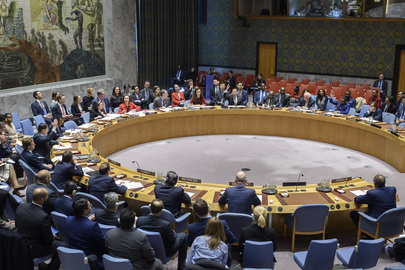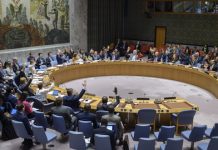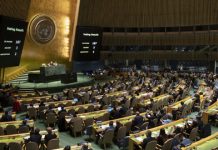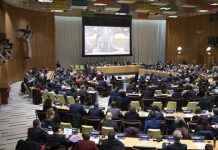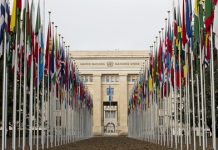Gains in tackling HIV/AIDS are being held back because people’s human rights are being ignored, warns UNAIDS
Despite huge progress in ending AIDS, the world is not yet on track to ensuring that it is no longer a public health threat; a lack of respect for people’s basic human rights is a major obstacle to the achievement of this goal, UNAIDS has said.
Marking this year’s World AIDS Day on 1 December, the UN agency said that of the nearly 40 million people living with HIV, 9.3 million still do not access life-saving treatment.
UNAIDS said that many people “are blocked” from accessing HIV services “that are essential to save their lives – and to end the AIDS pandemic”.
It pointed to girls being denied education and impunity for gender-based violence as common rights injustices – and the fact that for many LGBTi + people, a visit to health services can be dangerous. “To protect everyone’s health, we need to protect everyone’s rights,” UNAIDS said.
Echoing that message, Lebanon Bautista, a Community Engagement Manager from campaign group MPact in Mexico City, said that same-sex relations continue to be criminalized in 63 countries, at the expense of people living with HIV:
“Criminalization exacerbates fear, persecution, hate, violence and discrimination and it has a negative impact on public health. Queer people are left vulnerable, at increased risk, feeling isolated and excluded. Criminalization means more people will be in danger and more lives will end. We cannot end HIV unless we end criminalization.”
Last year, 630 000 people died of AIDS-related illnesses and 1.3 million people around the world acquired HIV.
In at least 28 countries, the number of new HIV infections is on the rise. To bring down the trajectory of the pandemic, it is imperative that lifesaving programmes can be reached without fear by all who need them, UNAIDS insisted.
5.5 billion people have internet access in 2024, says UN’s telecoms agency
An estimated 5.5 billion people have internet access today, an increase of 227 million on last year – but it’s still not enough, the UN’s telecoms agency, ITU, has said.
According to the International Telecommunication Union’s new Facts and Figures 2024 report, although 68 per cent of the global population are online, about one-third of the world’s people have been left behind.
Their development is suffering as a result, the agency warned.
Stubborn digital divides persist, particularly in rural areas in low-income countries, although connectivity is increasing worldwide all the time according to ITU’s Cosmas Luckyson Zavazava.
He told journalists in Geneva that it remains an urgent priority to connect the 2.6 billion people who remain offline. New technological solutions offer some hope, he said:
“We should look at technology with a human face. What is it that we are doing with the technology that we are producing? It is not only about investing in technology, but making sure some of the technology could be personal technology , like my smartphone. And some technology could be communal to make sure that communities have access.”
In high-income countries, 93 per cent of the population uses the internet today. This contrasts with low-income countries where only 27 per cent of people are online.
Wages are recovering after negative shift in 2022, says UN labour agency
Pay packets around the world rose 1.8 per cent in 2023 and continued their positive trajectory in the first half of the year, rising by 2.7 per cent on the back of a strong post-COVID recovery, the UN International Labour Organization (ILO) said on Thursday.
ILO Director-General Gilbert Houngbo said that if this trend continues, “it will be the largest gain in more than 15 years”.
Nonetheless, the ILO chief noted that this positive trend is not shared equally across regions.
Speaking in Geneva at the launch of ILO’s Global Wage Report, Mr. Houngbo noted that global wage gains reflect a notable recovery, compared with the 0.9 per cent decline in 2022. Back then, high inflation – and higher prices – outpaced wage growth.
The trend for bigger pay packets is less obvious in highly-industrialized economies, the UN agency said, pointing to a modest 0.9 per cent growth last year – less than six times what emerging economies saw in 2023.
Daniel Johnson, UN News.
Music composed and produced by Joachim Harris. All rights reserved
Source of original article: United Nations (news.un.org). Photo credit: UN. The content of this article does not necessarily reflect the views or opinion of Global Diaspora News (www.globaldiasporanews.com).
To submit your press release: (https://www.globaldiasporanews.com/pr).
To advertise on Global Diaspora News: (www.globaldiasporanews.com/ads).
Sign up to Global Diaspora News newsletter (https://www.globaldiasporanews.com/newsletter/) to start receiving updates and opportunities directly in your email inbox for free.


